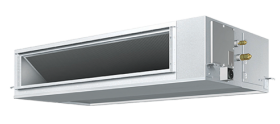Commercial Air Conditioning
Commercial air condition unit does not take space in a room since all its module is outside. It only sends cool air through vents located in each room. This type of air conditioning is more efficient especially if it will be used in bigger buildings like large hotels and commercial air condition
Commercial Air conditioners reduce the temperature of the air; they can be helpful in preventing heat blow. Air conditioners can crucially improve indoor air quality and create a much healthier atmosphere.
Main Types of Commercial Air Conditioning Systems
Air conditioning is now used in almost all commercial properties, ranging from cafes and small shops to large public spaces and office buildings. In order to meet the diverse needs of various types of commercial units, specialists have designed several types of air conditioning systems. There are almost an infinite number of configurations, but the main types of commercial air conditioning systems used in 2017 are Single Zone & Multiple Zone, Constant Volume & Variable, Radiant & Forced Air and Ducted & Ductless HVAC Systems.
Single Zone or Multiple Zone HVAC Systems?
The main difference between a single zone and a multi zone AC system is that the former is excellent for providing air conditioning for just one under-served area, while the latter is the ideal choice for a whole building. If you have a small shop or you already have an HVAC system in place and you want to add a new area in your building or shop, then a single zone HVAC should be your choice.
Conversely, if you have a large office building or a larger shop with multiple rooms, then you should probably go with a multiple zone device that allows you to control the temperature independently in each room/area.
Constant Volume vs Variable Volume HVAC Systems?
Another 2 types of commercial air conditioning systems are constant and variable volume. While in the case of a constant volume HVAC system the air has a constant speed all the time, with the flow staying the same, for variable volume systems the volume of the air is changed periodically based on your preferences and on the pressure sensors.
The variable volume HVAC systems come with the advantage of precise temperature control, lower energy consumption, reduced compressor wear & tear and increased passive dehumidification.
Radiant & Forced Air HVAC Systems?
When choosing between radiant or forced air HVAC Systems, you need to know that radiant systems are more energy efficient, reduce the lifecycle costs and offer enhanced thermal comfort. On the other hand, forced or all-air HVAC systems offer quicker heating or cooling, with an improved indoor air quality and better air flow. For example, in heavy polluted cities such as Beijing, forced air HVAC systems are a necessity.
Based on the benefits of these two types of HVAC systems, the final decision is yours.








